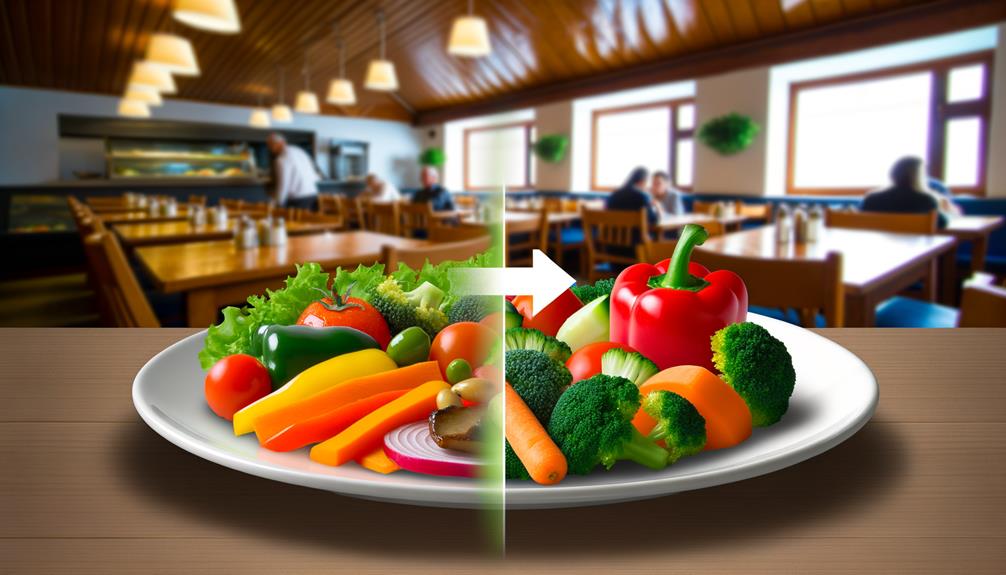Embarking on the journey to a plant-based diet can sometimes feel like navigating an unfamiliar city without a map. You’re committed to making healthier, more ethical choices, but when you’re dining out, it can seem as though every menu is written in a foreign language. This guide is your compass, pointing you towards delectable plant-based options in the maze of meat and dairy-laden dishes. You’ll gain insights on understanding menu terminology, conducting pre-dining research, and confidently communicating your dietary preferences. So, are you ready to discover how to maintain your plant-based lifestyle while enjoying the vibrant world of dining out? Let’s begin your culinary adventure.
Key Takeaways
- Utilize resources like HappyCow to find vegetarian/vegan or veggie-friendly restaurants
- Review the restaurant’s menu online in advance and look for steamed, baked, or grilled veggie dishes
- When dining at different cuisine types, choose options like pasta with marinara sauce at Italian restaurants, veggie sushi rolls at Japanese restaurants, and veggie-filled tacos or burritos at Mexican restaurants
- Communicate your dietary preferences clearly and politely with restaurant staff, ask about ingredients and preparation methods, and don’t be afraid to request modifications or alternatives to meet your needs.
Understanding Menu Terminology
When embarking on a dining adventure, knowing how to decipher menu terminology can significantly enhance your ability to find plant-based options in any restaurant. The first step in your dining out guide is understanding menu terminology, a crucial part of transitioning to a plant-based diet.
Start by identifying restaurants labeled as ‘vegetarian/vegan’ or ‘veggie-friendly’. These establishments are more likely to offer a variety of plant-based food. Use resources like HappyCow to locate such dining spots. It’s a good idea to review the plant-based menu online in advance. This enables you to identify suitable plant-based options before you arrive, making your dining experience more enjoyable.
Look for dishes that are steamed, baked, or grilled. These are usually healthier plant-based options, as they tend to be lower in fats and oils. Always communicate your dietary preferences politely with the server. Being clear about your needs allows them to better serve you and ensure your meal aligns with your plant-based diet.
Embrace your journey towards a healthier, more sustainable lifestyle. Let this Guide to Plant-Based Dining be your compass, helping you navigate the exciting world of vegan or plant-based dining with ease and confidence.
Pre-Dining Research and Preparation
Before you head out for a meal, it’s essential to do some pre-dining research and preparation to ensure an enjoyable and stress-free dining experience on your plant-based diet. Start by checking the restaurant’s menu online. This helps you identify vegan options and determine if the food aligns with your dietary preferences.
Make use of resources like Happy Cow, an app that lists Restaurants That Offer completely plant-based meals. It’s an excellent tool for your pre-dining research and preparation, making it easier to find suitable places to eat.
When perusing menus, look for steamed, baked, or grilled veggie dishes. These are often healthier and fit well into a plant-based diet. Don’t limit yourself to restaurants that solely offer vegan options. Many eateries have veggie-friendly dishes that can be easily tweaked to fit your needs.
Navigating different cuisine types can be an exciting adventure as you discover the array of plant-based options available at various restaurants. As you transition to a plant-based diet, you’ll find that each type of restaurant offers unique vegan and veggie dishes. The key is to eat whole, natural foods regardless of the cuisine.
Here are a few tips for different cuisine types:
- Italian Restaurants
- Opt for pasta dishes with marinara sauce instead of creamy, cheesy sauces.
- Look for minestrone soup or other vegetable-based soups.
- Japanese Restaurants
- Veggie sushi rolls are a staple.
- Steamed edamame and miso soup are other excellent choices.
- Mexican Restaurants
- Choose veggie-filled tacos or burritos.
- Opt for beans and rice as sides, just make sure they’re not cooked in lard.
When you go out to eat, don’t hesitate to ask the staff about their vegan options. They’re there to help you navigate this dining out guide. Transitioning to a plant-based diet is an exploration of flavors, so enjoy the journey and the wide variety of whole food options available to you.
Communicating Dietary Preferences
After you’ve found a restaurant with promising plant-based options, the next step is to effectively communicate your dietary preferences to the staff. Be clear, friendly, and direct. Don’t be afraid to ask about ingredients and preparation methods. For instance, in a Whole food restaurant, you might ask if a meal can be made without certain ingredients.
You should feel comfortable ordering customized meals or modifying menu items. If sushi options are available, for example, you could request for a veggie roll instead of one with fish. Always ask for what you need to enjoy your meal without compromising your plant-based diet.
Express your gratitude when your requests are accommodated. This act not only fosters good relationships with the restaurant staff but also makes dining out with friends and family more enjoyable.
| Always ask | Customize your meal | Express gratitude |
|---|---|---|
| Inquire about ingredients and preparation | Request for modifications or alternatives | Thank the staff for their help |
| Ask if a meal can be made without certain ingredients | Substitute animal-based ingredients with plant-based ones | Show appreciation when your dietary needs are met |
| Don’t hesitate to ask about sushi options | Feel comfortable ordering customized meals | Thank the chef for their flexibility |
| Ask for what you need | Don’t be afraid to make special requests | Express gratitude when your requests are accommodated |
| Ensure the meal aligns with your plant-based diet | Make the menu work for you | Maintain a friendly and appreciative attitude |
Coping With Social Pressure
When dining out on a plant-based diet, you might encounter some social pressure, but it’s essential to stay assertive and confident in your dietary choices. It can be challenging, especially when dining out with friends or family who don’t follow a similar diet. Here are a few strategies for coping with social pressure:
- Be prepared: Scan the menu before you go. Many establishments have options listed for plant-based diets. Seek out whole foods and good veggie options. Veggie sushi is a great choice at a sushi restaurant.
- Make sure to ask your server about the ingredients, just to be safe.
- Always remember, you have 72 hours to digest, so choose wisely.
- Not all options are available everywhere, so be flexible and creative.
- Keep the focus on the delicious food, not your dietary restrictions.
- Seek out supportive friends and family who respect your choices.
Frequently Asked Questions
How Long Does It Take to Adjust to a Plant-Based Diet?
Adjusting to a plant-based diet varies. You’ll experience dietary changes, nutritional balance shifts, potential detox symptoms, and taste adaptation. Digestive alterations, energy fluctuations, emotional responses, and craving management are part of the journey. Patience and perseverance are key.
What Is the Easiest Way to Transition to a Plant-Based Diet?
Ease into a plant-based diet with grocery planning, exploring local markets, and meal prepping. Try recipe swapping for comfort food alternatives, read food labels, and take dietary supplements. Be aware of nutrients and enjoy plant-based snacking.
What Happens to Your Body When You Switch to a Whole Food Plant-Based Diet?
When you switch to a plant-based diet, you’ll notice improved nutrient absorption, diverse protein sources, reduced bloating, higher energy levels, glowing skin, digestive changes, better blood pressure, weight loss, increased immunity, and balanced hormones.
How Can a Vegan Diet Be Accommodated in a Restaurant Setting?
Navigating menus becomes a treasure hunt for vegan options, but don’t worry. You can request menu modifications, explore new dishes, and communicate your dietary restrictions. It’s all about finding vegan-friendly restaurants and enjoying cultural cuisine choices.







